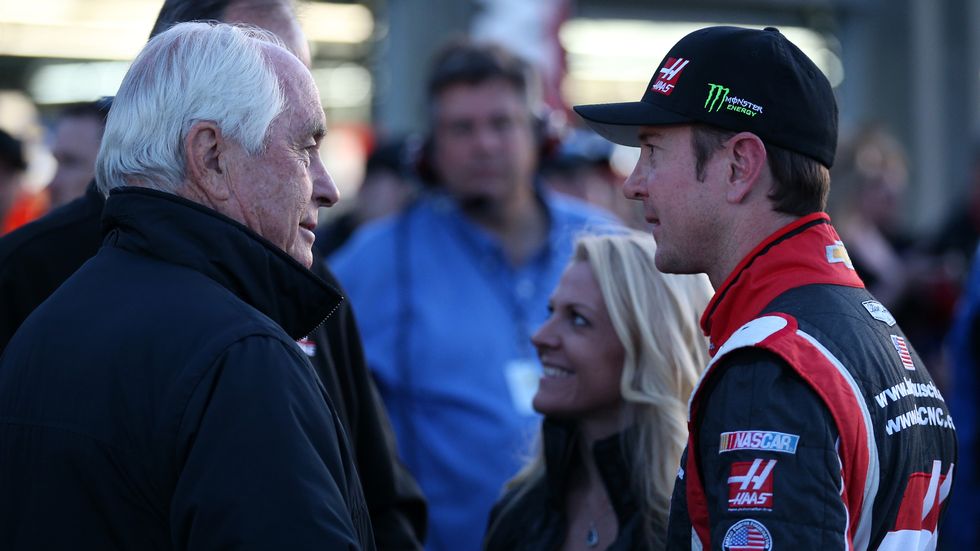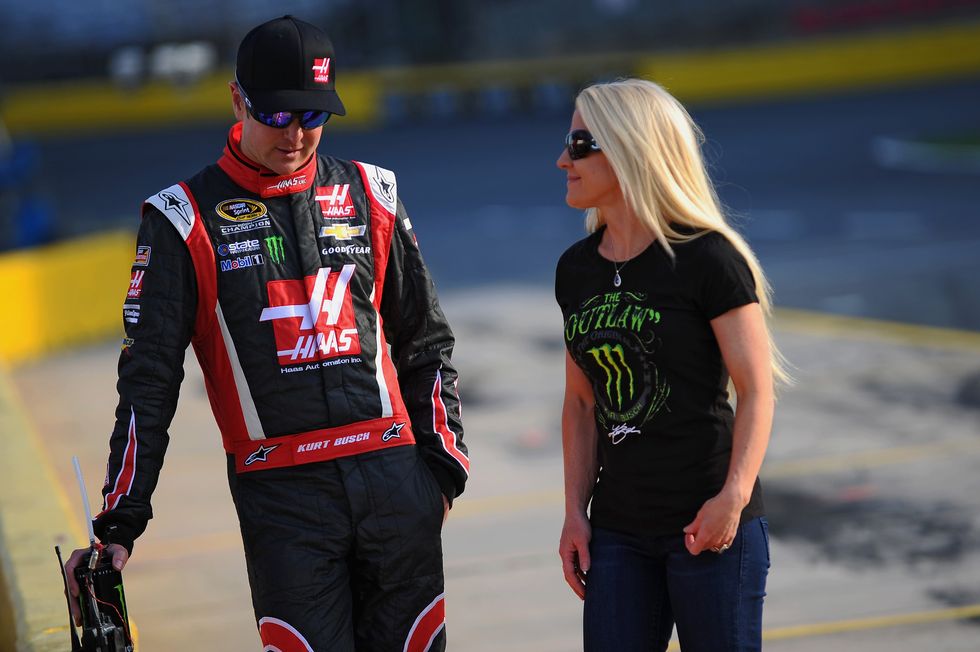- Kurt Busch arrived in 2000 with a temperamental, petulant, arrogant and combative attitude that often seemed to threaten his career at almost every turn.
- Busch won 34 races in his Cup career and captured the Cup Series championship in 2004.
- Busch’s rap-sheet is long and varied, and his run-ins with the media are legendary.
Editor’s Note: This is the second of a two-part look at the racing life and times of NASCAR Cup Series champion Kurt Busch, who announced his retirement from the sport this past week.
Kurt Busch is a cinch to make the NASCAR Hall of Fame when he becomes eligible in a few years. His credentials are impressive: former Cup Series champion, former Daytona 500 winner, 34-time race winner, an accomplished talent no matter the length of the track or its layout, and a winner in all three of NASCAR’s top series.
But there were times when veteran NASCAR-watchers wondered whether the young Las Vegas native would hang around long enough to make anything of himself. He arrived in 2000 with a temperamental, petulant, arrogant and combative attitude that often seemed to threaten his career at almost every turn. It may be that history looks up on his missteps as much as his successes.
In the end, though, talent and maturity won out. Indeed, during his recent retirement announcement at Daytona International Speedway he sounded more like a settled and thoughtful elder statesman than what we endured early into his 23-year career.
“Racing at NASCAR’s highest level requires every last bit of focus, heart, stamina and determination,” Busch said. “Right now, I can’t give what is required to compete at that level, so I’m officially announcing my retirement. As I transition out of the driver’s seat, I can’t help but feel incredibly blessed to have spent the amount of time as I did as a driver. I could have never imagined it growing up as a blue-collar kid in Las Vegas.”
Busch’s rap-sheet is long and varied. He was turned out by respected owners Jack Roush and Roger Penske. He was suspended from five races, two from Roush and three from NASCAR. He was fined $50,000 on two occasions and spent a dozen or more races on probation. His feuds with the media were legendary.
His first public blowup came near the end of 2005, when he was arrested for traffic violations near Phoenix. He was cuffed and detained on suspicion of drunk driving and cited for reckless driving. He refused to perform standard field sobriety tests, but submitted to a breath alcohol test that showed the presence of alcohol well below the legal limit.
The next day he released this apology. “I regret the incident that occurred,” he said. “It is important to understand that this citation is not alcohol related. I apologize to the Maricopa County sheriff’s department for my actions. I admit I became a bit argumentative with the officer when he continuously insisted that I submit to a field sobriety test and a breath test, which I ultimately did. I regret that my actions, including saying some disrespectful things to the officer, made the situation worse.”
Busch pleaded the reckless driving charge down to speeding, paid an $850 fine, and agreed to perform 50 hours of community service. Roush took Busch from his No. 97 Ford for that weekend’s race and the season-finale at Homestead.
Busch did well enough during his 2006-2011 run with Team Penske, but never seriously challenged for the Cup. His only major outburst during those years was in the 2011 season-finale at Homestead, his last race with Penske. After a disappointing DNF, he spewed a series of profanities as ESPN reporter Dr. Jerry Punch waited for network clearance. Punch finally gave up and walked away as Busch continued to fume and use foul language. That was so much over the line that NASCAR fined him $50,000 for “abusing the media.”
In October of 2012, during his last days with James Finch’s underfunded team, Busch escaped penalty after he abruptly left the scene after an accident at Talladega Superspeedway. Even as safety and rescue workers were by his car, he suddenly climbed back in and drove away without his helmet and without his restraint system belts secured. Officials parked him for the rest of the race and considered that to be penalty enough.
Less than three years later, in May of 2015 while driving for Stewart-Haas Racing, he was fined $50,000 for reckless driving on pit road at Darlington. In addition to the fine, he was placed on probation for the next eight races. The issue began when Busch had a flat tire and spun, inadvertently hitting Ryan Newman. After his pit service, Busch did a smokey burnout through Newman’s pit, where crewmen were still gathering their equipment.
Busch always had a love-hate relationship (hate, mostly) with the media. While capable of being polite and accommodating when it suited him, he could also be rude, surly, and threatening. The moments with Dr. Punch at Homestead were perhaps his best-remembered, but they were far from the only ones.
He once told a reporter after an Xfinity Series race at Dover that probation was the only thing keeping him from punching the reporter. “(Probation) refrains me from not beating the shit out of you right now because you ask me stupid questions,” Busch snapped at the reporter. “But since I’m on probation, I suppose that’s improper to say as well.”
On another occasion, he confronted two reporters during the same post-race media session at Richmond. He first denied ever saying anything untoward about his rivalry with Jimmie Johnson, then ripped up a printed transcript offered by another writer as proof of the comments.
Unquestionably, his best-known public troubles came in 2014-2015 and involved girlfriend Patricia Driscoll. She was president of the Armed Forces Foundation, a non-profit that provided “financial assistance, morale activities, career and educational opportunities to wounded service men and women and their families.”
Busch was not only her romantic significant other, but a “celebrity ambassador” for the organization. After an emotional breakup late in September of 2014, she drove from Washington, D.C. to Dover, Del., scene of the Sept. 28 Cup race. She went to Busch’s motorcoach where, she alleged, he strangled her and smashed her head into a wall during an argument over their relationship.
Six weeks later, a Delaware court issued a protective order against Busch and ordered a mental health evaluation. Driscoll characterized her former boyfriend as battling alcoholism and depression leading up to the alleged assault. Busch testified he was afraid of Driscoll, whom he believed was a trained assassin because of the stories and photos she had shared with him.
In February of 2015, Judge David W. Jones ruled that Busch had, indeed, committed “an act of abuse” against Driscoll and issued a one-year protective order. In his 26-page report, issued two days before the Daytona 500, Jones wrote that he believed Driscoll’s claim that Busch put a hand around her neck and smashed her head against a wall in his motorcoach.
Even though Busch was not charged at the time and hasn’t been since, NASCAR nevertheless suspended him from 2015’s first three races.“Given the serious nature of the findings and conclusions made by the (Delaware judge), we have indefinitely suspended Kurt Busch, effective immediately,” NASCAR said in a statement.
To the surprise of some and the relief of many, the Driscoll affair was Busch’s last public stumble. Older, wiser, and apparently more comfortable with himself, he finished his career winning with Stewart-Haas, Chip Ganassi, and the new Hamlin/Jordan 23XI team.
In virtually every respect, his 23-year run was one for the books.
Part 1: Future NASCAR Hall of Famer Kurt Busch Never Mailed It In.
Contributing Editor
Unemployed after three years as an Army officer and Vietnam vet, Al Pearce shamelessly lied his way onto a small newspaper’s sports staff in Virginia in 1969. He inherited motorsports, a strange and unfamiliar beat which quickly became an obsession.
In 53 years – 48 ongoing with Autoweek – there have been thousands of NASCAR, NHRA, IMSA, and APBA assignments on weekend tracks and major venues like Daytona Beach, Indianapolis, LeMans, and Watkins Glen. The job – and accompanying benefits – has taken him to all 50 states and more than a dozen countries.
He’s been fortunate enough to attract interest from several publishers, thus his 13 motorsports-related books. He can change a tire on his Hyundai, but that’s about it.
Read the full article here




